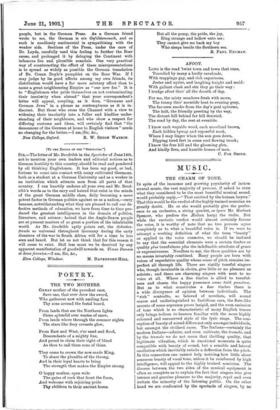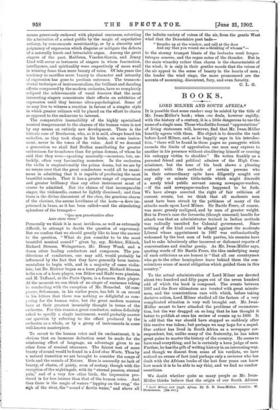MU S IC.
THE CHARM OF TONE.
IN spite of the immense and growing popularity of imam. mental music, the vast majority of persons, if asked to state what they considered to be the most beautiful musical sound; would probably reply,—" That emitted by the human larynx." That this would be the verdict of the:highly trained musician we greatly doubt. He or she would probably give the prefer- ence to an orchestra, a string quartet, or (pace Mr. Herbert Spencer, who prefers the 2golian harp) the violin. But while the exoteric verdict would almost certainly favour the voice, it is worthy of note that no two persons agree completely as to what a beautiful voice is. If we were to attempt a working definition of what the term "beauty" as applied to the voice connotes, we should be inclined to say that the essential elements were a certain timbre or quality plus tunefulness plus the indefinable attribute of grace or expressiveness. Needless to say, the three qualities are by no means invariably combined. Many people are born with voices of superlative quality whose sense of pitch remains im- perfect all through life. There are rigidly tuneful singers who, though invaluable in choirs, give little or no pleasure as soloists ; and there are charming singers with next to no voice at all. Where a fine timbre is allied to tuneful- ness and charm the happy possessor onvae tulit punctunt. But as to what constitutes a fine timbre there is a wide divergence of opinion between individuals. The "rich" contralto, so beloved of novelists, will sound coarse and undistinguished to fastidious ears, the flute-like accents of some sopranos prove insipid, and the even emission of tone which is so characteristic of many English tenors only brings tedium to hearers familiar with the more highly coloured and unreserved style of the lyric stage. The con- ception of beauty of sound differs not only amongst individuals, but amongst the civilised races. The Italians—certainly the modern Italians—admire, and even cultivate, the tremolo, and by the tremolo we do not mean that thrilling quality, that legitimate vibration, which in emotional moments is quite compatible with beauty of sound, but a sensible and lateral oscillation which inevitably entails a deflection from the pitch. In this connection one cannot help noticing how little sheer sensuous beauty of vocal tone, unless it be reinforced by high intelligence, will appeal to the highly trained musician. The divorce between the two sides of the musical equipment is often so complete as to explain the fact that singers who give intense and genuine pleasure to the majority, repel and even irritate the minority of the listening public. On the other hand we are confronted by the spectacle of singers, by no
means generously endowed with physical resources, extorting the admiration of a select public by the magic of superlative artistry, by consummate musicianship, or by a. sincerity and poignancy of expression which disguise or mitigate the defects of a naturally harsh and intractable organ. Among the great singers of the past, Malibran, Viardot-Garcia, and Jenny Lind will occur as instances of singers in whom fascination, intelligence, and spirituality were respectively of more avail in winning fame than mere beauty of voice. Of late years the tendency to sacrifice mere beauty to character and intensity of expression has gone to perilous extremes. The transcen- dental technique of instrumentalists, the brilliant and dazzling effects compassed by the modern orchestra, have so completely eclipsed the achievements of vocal bravura that the most interesting singers concentrate their efforts on subtleties of expression until they become ultra-psychological. Some of us may live to witness a reaction in favour of a simpler style in which greater reliance will be placed on the effort to charm as opposed to the endeavour to interest.
The comparative insensibility of the highly specialised musical temperament to the charms of the human voice is not by any means an entirely new development. There is the historic case of Beethoven, who, so it is said, always heard his melodies, as they took shape in his brain, on some instru- ment, never in the tomes of the voice. And if we descend a generation we shall find Berlioz manifesting far greater enthusiasm for trombones than for prima donnas, of whom he said that they were—speaking musically—monsters, but, un- luckily, often very fascinating monsters. In the orchestra the violin is unquestionably the prima donna, but we are by no means sure that the great conductors would all be unani- mous in admitting that it is capable of producing the most beautiful sounds. That it has a greater range of expression and greater brilliancy than any other instrument must of course be admitted. But the claims of that incomparable singer, the violoncello, cannot be lightly dismissed; and then there is the divine discontent of the oboe, the gracious charm of the clarinet, the serene loveliness of the horn—a dove im- prisoned in brass, as it has been called—and the stimulating splendour of the trumpet—
"Quo non praestantior alter Aere ciere viros."
Personally we think it is most invidious, as well as extremely difficult, to attempt to decide the question of supremacy. But we confess that we should greatly like to hear the answer to the question, "What do you consider to be the most beautiful musical sound ? " given by, say, Richter, Nikisch, Richard Strauss, Weingartner, Mr. Henry Wood, and a dozen other leading conductors and composers. The pre- dilections of conductors, one may add, would probably be influenced by the fact that they have generally been instru- mentalists to begin with, and in a majority of cases violin- ists; but Dr. Richter began as a horn player, Richard Strauss is the son of a horn player, von Billow and Halle were pianists, and M. Taflanel, at the Paris Opera, is a famous flute player. At the moment we can think of no singer of eminence taking to conducting with the exception of Mr. HenscheL Of com- posers, Schumann, in his earlier years, has left it on record in his letters that there was nothing so delightful as com- rosing for the human voice, but the great modern masters have at their greatest invariably thought in terms of the orchestra. For this reason a great conductor, unless definitely asked to specify a single instrument, would probably answer our question by referring to the effect produced by the orchestra as a whole, or by a group of instruments in some well-known masterpiece.
To revert to the human voice and its enchantment, it is obvious that an immense deduction must be made for the reinforcing effect of language, an advantage given to no other form of musical utterance. The fairest test of mere beauty of sound would be found in a Lied ohne Worte. Thus by a natural transition we are brought to consider the songs of birds and the sounds of Nature. Here is assuredly no lack of beauty, of charm, of gaiety, even of ecstasy, though with the exception of the nightingale, with its "eternal passion, eternal pain," and of a very few other birds, the impression pro- duced is fax less intense than that of the human voice. And then there is the magic of waters "lapping on the crag," the sigh of the river, the "sound o' flowen water," and above all
the infinite variety of voices of the air, from the gentle West wind that the Dorsetehire poet bade- " Breathe up at the window, and call at the door
And say that you round me a-thinking of whoam"— to the stormy trumpet blasts of the luetantes venti tempes- taiesgue sonorae, and the organ notes of the thunder. But in the main wizardry rather than charm is the characteristic of the wind; it is only in their gentler moods that the voices of
the air appeal to the sense of beauty in the hearts of men ; the louder the wind sings, the more pronounced are the accents of mourning, discontent, fury, and even ferocity.
C. L. G.







































 Previous page
Previous page